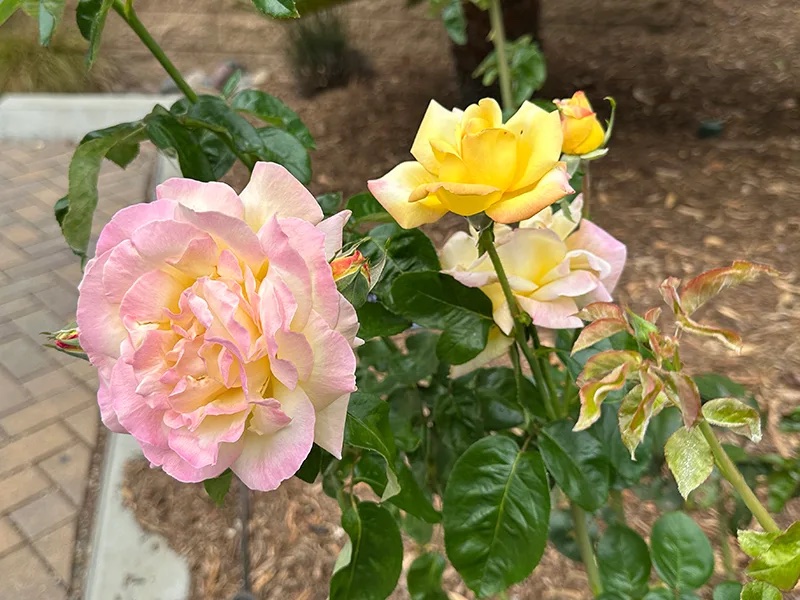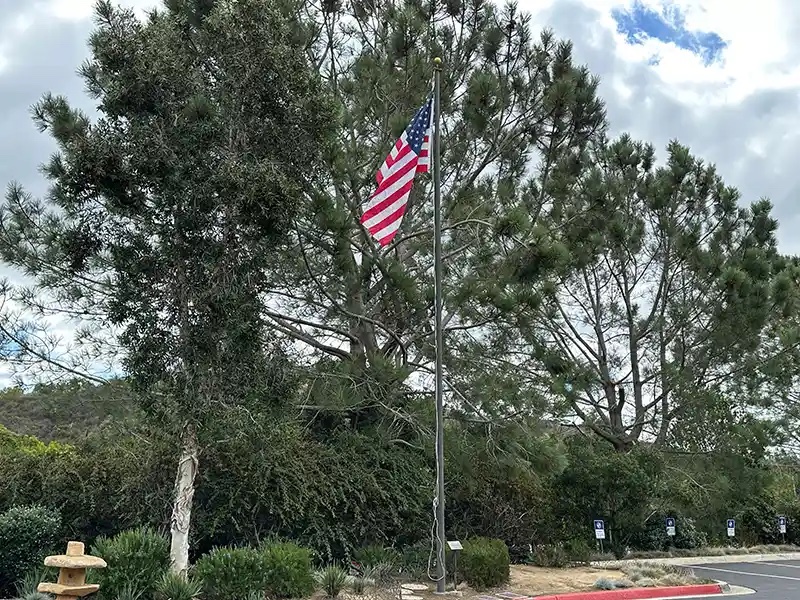By Friday afternoon last week, the campus flag at The Grauer School was a mess. It was twisted and tangled high on the pole, and I got the call first thing Saturday to try and get it down.
I arrived early, still in a wetsuit from the dawn patrol surf session, and pulled my car in next to the truck of Rogelio, the school’s gardener. He was unloading the lawnmower. I said, “Hola,” and he gave me his regular nod and smile, in his element. He works Saturdays so he might hardly recognize me if I wasn’t in a wetsuit.
I went over to the flagpole and found there were knots and tangled wraps at the cleat where the halyard ties off, the kind sailors call a bird’s nest. I looked up and there, way at the top of the flagstaff where the pully is, the halyard was jammed and snarled into more twisted lines, the flag wrapped all around and through it.
I went over to the flagpole to start freeing it up. I started shaking and weaving and jiggling on the halyard. I bargained and played with the lines like a fishing pole after a bad cast, and after a while it slid free and I coaxed Old Glory down, draping it over my lap so as not to get it soiled on the ground, but now I had to fold it. No one was around. You can’t fold a flag yourself. Well, Rogelio, was around. I signaled him, and he cut his mower and walked over. I put one side of the bundle in his hands and backpedaled so the flag was taut, long and lengthwise between us.
Rogelio stood facing me, holding the stripes, and I held the stars. We gave some little shakes and then folded it twice long-ways until it was an eight-foot long, narrow four-layer strip ready for the triangular folds. Like most people, he evidently had never folded the flag. Triangle by triangle, Rogelio tried to work his way up the flag towards my end. His hands looked powerful and steady, landscaper hands. Each time he folded, I tentatively guided his hands, showing him the way each triangle folds neatly side to side, until we were just a foot apart and only the starry blue field was between us.
I did not think I’d ever done a task with Rogelio, so it grew, for me, into a moment of restoring something that had been neglected, a quiet moment, surrounding this symbol that belongs to us both, and I think it was heightened, not lessened, by the fact that he spoke so little English. The whole thing, the silent folding of the American flag, had to speak for itself, like an art piece that was beyond explanation.
We finished up the last triangle and I gave the stars end a tuck into the last fold, smiled at him, and then took the finished triangle of a flag over to the main office.
Then I got in my car, pulled it out into the parking lot to leave, turned off the car, and got out. I went back to the school garden where Stephanie Murphy and Sally Grauer, Grauer Garden coordinators, and alumni parent Laiken Chan, were harvesting lettuce and incredibly sweet cherry tomatoes. I asked them who could help me with some Spanish. I’ve known Laiken for many years, but I didn’t knew she was fluent in Spanish. We started walking over to Rogelio in the quad where he was mowing the grass again. I was saying to Laiken it should not be this way but these are strange days, and that it was still important to thank Rogelio more than I had done in the past for helping me. “I want to try and make him know how much I appreciate him being around,” I told her, “but I am also overdue in making sure he is seen and known, in a good way.”
Almost anything might feel threatening in these days to someone with deep roots elsewhere, but now it was me feeling that, like I believe my own grandfather felt over 100 years ago. I was happy that it was Rogelio’s flag, too, as a citizen, but understood we both knew others in these times who were not citizens, that we shared the risks and hardships that were out there.
Rogelio shut down his mower again and Laiken started thanking him. “He’s been here for many years,” I told Laiken, and she thanked him for that, in Spanish, and he smiled.

“He trabajado en esta tierra por 24 años. Me acuerdo de cuando no estaban estos edificios.” He remembered our land right here before there were walls, before there were buildings, as if he were part of the simple life our school started out with.
“Twenty four years” working here, I understood Rogelio to be saying, from Baja-surf-trip Spanish plus some DuoLingo, and I started making hand signals about what the old trailers were like before we built out our campus, laid out the grass and orchards, and piped in recycled water, both of us smiling and proud about our time on this same land. He had walked the sports field way more than I had. But that was my one-dimensional image of him, pretty much just silent lawn mowing — not much different than if I lived in a wetsuit.
I was glad that he would not know the newsreel in my mind, could not know, either, my fear that he might think I was asking too many questions. Always strategy, but I was banking that is the way of my world, not his, that he would not carry that weight. Laiken and I learned that he had been born and married in the countryside outside Guadalajara, that he and his wife had built their life here over decades, and that they have a 28-year-old son, Rubén. Suddenly I remembered, years ago, the joy on his face as he prepared a birthday party for his wife, María de Jesús.
So I was happy in thanking him now, while that same newsreel made it feel risky to talk much about his heritage, which is a terrible and stupid newsreel, and which I do not have enough access to, but across the country there are startling developments. Just up the street from here at the elementary school that my daughter attended, a school dad disappeared at the school gates, carried off by people the newspaper described as “armed, masked men” while his daughter and wife watched nearby, screaming and crying.
All this was a part of the little newsreel in the back of my mind that was getting heavier, and it kept me on alert to be careful with anyone with the “wrong” surname or accent, but to not fail to show appreciation and respect when it is due, even in a time when it felt like there was fear casting a haze around us all.
Fear has many uniforms, but it moves in plain sight, as in the Home Depot parking lot in Los Angeles where agents rushed to arrest people, and the enforcement rippling through our communities. That’s what fear is, it’s the haze you hide in when things are happening in plain sight and you do nothing, say nothing. And at the end of our conversation when Rogelio said he had to go get a part at the nearby Home Depot down the street, I felt dour at first but then, resolute. We are pressing on.
I looked at him, and felt the strangeness of how little we had spoken in all his years here working for me, how 24 years is most of a whole career, landscaping our school every Saturday, mainly invisible like so many others across the country in schools and farms and families.
A flag was the first thing I ever bought for our school, maybe ten or twenty flags ago, and now our flag was whole again. It felt good that we’d had our hands on it, me and Rogelio, and, next week, after the holiday, I would go into the 7th grade homeroom, where the color guard is always based at our school, carrying the flag, and I would tell them about how we had made that tight blue triangle of stars and patted it on top. We’d talk about how to make a half-hitch on the flag halyard and why we raise the flag every day. And it’s also important that they learn about how the lawn has been mown since long before they were born.
Join the Small Schools Movement!
Would you like your organization or small learning community showcased in our member spotlight? If you are not yet a member of the Small Schools Coalition, we welcome you to become a friend free of charge.
If you are already a member, contact us to discuss how we can give you the complimentary platform to show the entire world what makes your small school special!


Recent Comments